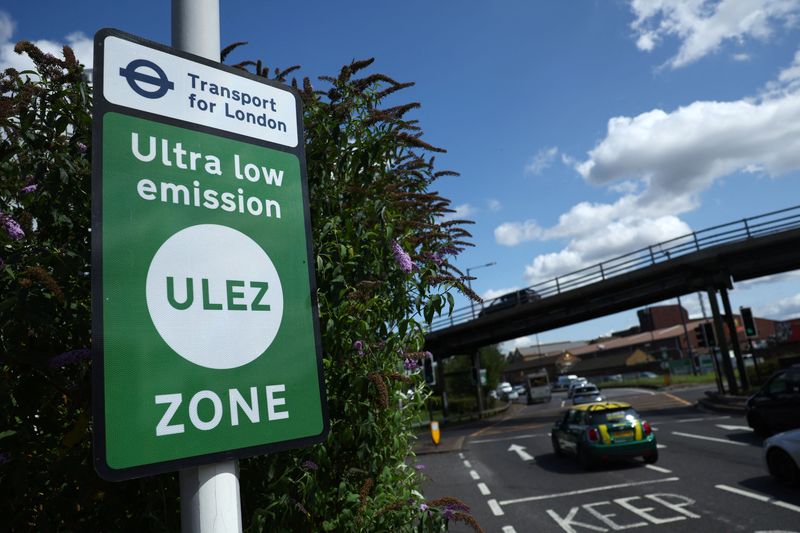By Sachin Ravikumar
LONDON (Reuters) -A London scheme to cut traffic emissions by imposing a daily charge on the most polluting vehicles expanded to the whole of the British capital on Tuesday, despite fierce opposition from those who say it will exacerbate a cost of living crisis.
The Ultra Low Emission Zone (ULEZ) was introduced in 2019 in a small part of central London and was further expanded in 2021. It will now extend to cover areas that are home to an extra five million people, often with fewer public transport links.
London Mayor Sadiq Khan says the expansion will reduce deaths from illnesses linked to air pollution and help to curb climate change.
But opponents argue the 12.50 pound ($16) daily charge on the thousands who drive older, more polluting vehicles, is unfair and will cause economic damage.
Simplified as an economy-versus-environment debate, the London row mirrors challenges policymakers around the world are facing as the cost of efforts to tackle a catastrophic rise in global temperatures start to be felt.
In Europe, moves to improve the energy efficiency of buildings and transport have increased pressure on politicians, with the Polish government going as far as suing Brussels over its climate policies.
Khan told the BBC on Tuesday that introducing the expanded zone was difficult but necessary. He has previously said that those living in the poorest areas are exposed to the highest levels of pollution.
"The expansion of ULEZ is an integral part of our policies to address air pollution, to address the climate emergency, but also to make sure we address the issue of social injustice," he said.
Khan says nine in ten cars in London are already ULEZ-compliant, but opponents have challenged that figure.
Protesters have taken out their ire on ULEZ enforcement cameras, with London's Metropolitan Police recording 164 stolen and 185 damaged cameras as of Aug. 1. Purported videos of vandalism have also surfaced on social media platforms.
London's transport authority said it has increased security for the cameras. It plans to install a total of 2,750 cameras in outer London, of which 1,900 are currently in place.
The expansion has ignited a debate in Britain, which is targeting net zero emissions by 2050, on how to implement environmental policies without alienating voters.
ULEZ was blamed for a narrow by-election defeat in outer London last month for the opposition Labour Party, which otherwise enjoys a strong opinion poll lead over the governing Conservatives ahead of a national election expected next year.

In a bid to calm the outcry following that defeat, Labour Mayor Khan announced additional funding to extend a ULEZ scrappage scheme to all Londoners with a non-compliant car. Critics have said the scheme, offering a grant of up to 2,000 pounds, is inadequate.
($1 = 0.7928 pounds)